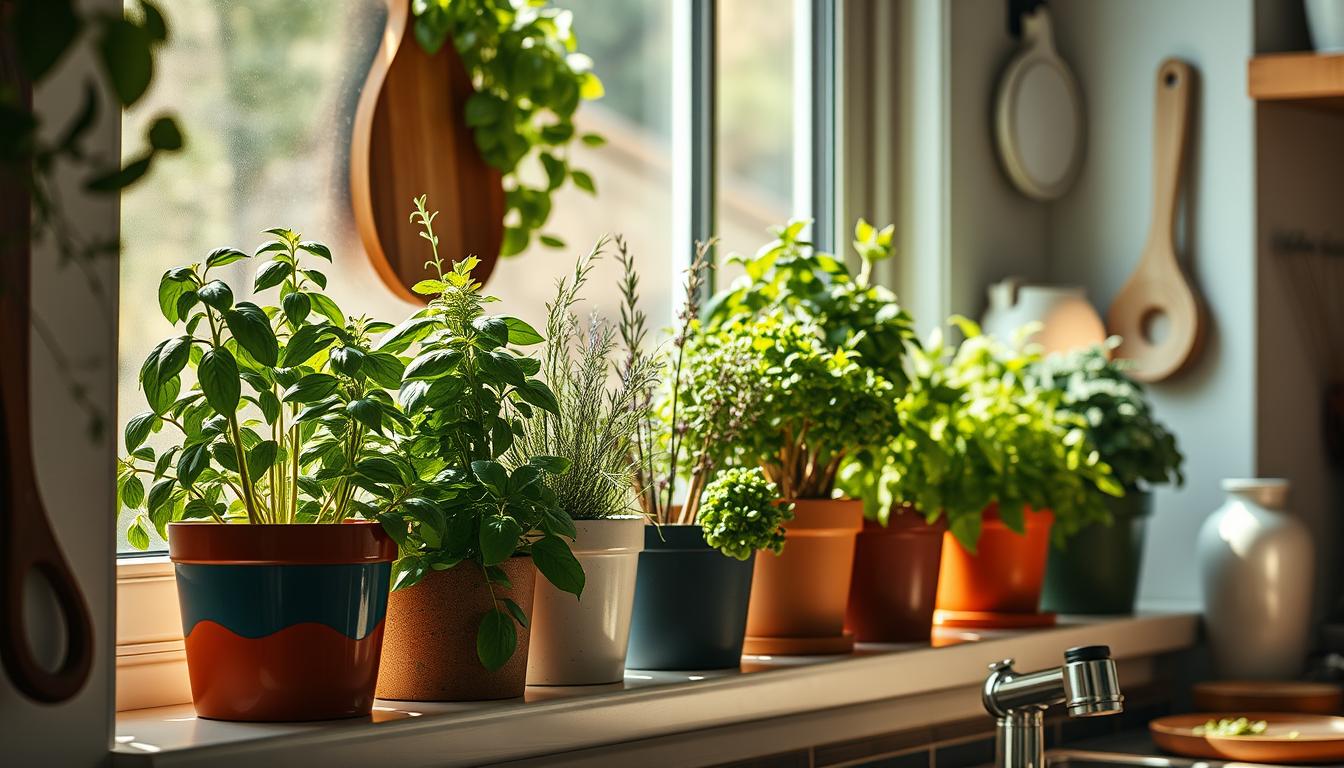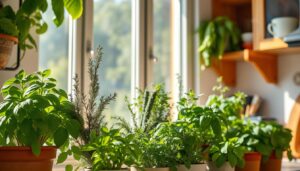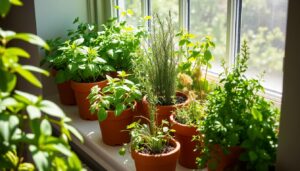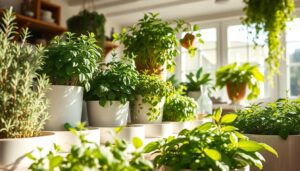Did you know a small indoor herb garden can produce up to 4 pounds of fresh herbs yearly? With the right fertilizer, your indoor herbs can grow better and taste better. Find out the top fertilizers to make your indoor herb garden thrive.
Key Takeaways
- Herbs have varying fertilizer needs based on the type, growing conditions, and soil composition
- Slow-growing herbs like rosemary require less fertilizer than fast-growing herbs like basil
- Organic and synthetic fertilizers both have a role to play in indoor herb gardens
- Proper fertilization schedules and avoiding over-fertilization are crucial for healthy herbs
- Hydroponically grown herbs have unique nutrient requirements
Why Fertilize Indoor Herbs?
Many indoor gardeners ask, “Why fertilize my herb plants?” The reason is simple. Indoor herbs grow in containers and don’t get the same nutrients as outdoor plants. They need extra help to stay healthy.
Herbs Require Essential Nutrients for Growth
Herbs need important nutrients like nitrogen, phosphorus, and potassium. They also need smaller amounts of other nutrients to grow well. When herbs are in pots, the soil can run out of these nutrients fast. That’s why fertilizing indoor herbs is key to their health.
Not fertilizing your herbs can lead to problems. You might see them growing slowly, having discolored leaves, or producing less. Keeping up with fertilizing of indoor herbs is crucial for a healthy garden.
Healthy herbs start with a balanced diet of essential nutrients. Fertilizing indoor herbs is the key to keeping them thriving in your home.
Knowing what nutrients indoor herbs need and using the right fertilizer makes a big difference. You’ll get a garden full of tasty and fragrant herbs.
Fertilizer Needs Based on Herb Type
Understanding the fertilizer needs of your indoor herb garden is key. Herbs fall into two main groups: slow-growing and fast-growing. Each group has its own fertilizer needs.
Slow-growing herbs like rosemary and thyme prefer dry, poor soil. They don’t need much fertilizer. Fast-growing herbs, such as basil and cilantro, grow quickly and need more fertilizer.
Knowing what your herbs need helps keep your garden healthy. By adjusting your fertilizing, you make sure your plants get the right nutrients. This leads to a garden full of herbs for your cooking.
| Slow-Growing Herbs | Fast-Growing Herbs |
|---|---|
| Rosemary, Thyme, Sage, Oregano | Basil, Cilantro, Parsley, Mint |
It’s important to know the fertilizer needs of slow and fast-growing herbs. By choosing the right fertilizers, your herbs will grow well. This means you’ll always have fresh herbs for your cooking.
“The key to a successful indoor herb garden is to tailor your fertilization practices to the specific needs of each herb type.”
Best Fertilizers for Indoor Herb Gardens
Choosing the right fertilizer is key for a thriving indoor herb garden. The best fertilizers for indoor herb gardens give your herbs the nutrients they need to grow well. Whether you prefer organic or synthetic options, pick the top fertilizer recommendations for indoor herbs that fit their needs.
A balanced fertilizer with equal parts nitrogen, phosphorus, and potassium (N-P-K) is great for indoor herbs. Organic choices like fish emulsion or seaweed-based fertilizers offer a steady, gentle supply of nutrients. Synthetic fertilizers work fast but be careful not to overdo it.
How often you fertilize depends on the herb, soil, and growing conditions. Some herbs, like basil and cilantro, need more food often. Others, like rosemary and thyme, need less. Adjust how often you feed your herbs based on their specific needs for best growth and health.
“The right fertilizer can be the secret to a thriving indoor herb garden. It’s all about finding the perfect balance to nourish your plants.”
Whether you go for organic or synthetic, the best fertilizers for indoor herb gardens and top fertilizer recommendations for indoor herbs should match your herbs’ needs. Giving the right nutrients at the right time helps your indoor herb garden flourish and gives you a great harvest.
Organic Fertilizers for Herb Gardens
Organic fertilizers are a great choice for your indoor herb garden. They offer many benefits that make them perfect for your herbs. These natural solutions help your herbs grow strong and flavorful.
Benefits of Organic Fertilizers
Organic fertilizers give your indoor herbs a steady supply of nutrients. This reduces the chance of giving them too much food. Options like compost, fish emulsion, and seaweed-based products are full of good microbes and humic acids. These help your herbs absorb nutrients better and keep the soil healthy.
- Slow, steady release of nutrients to prevent over-fertilization
- Contain beneficial microbes and humic acids to support healthy soil
- Safer for edible herbs as they are free from synthetic chemicals
Choosing organic fertilizers is also safer for your indoor herb gardens. They don’t have synthetic chemicals. So, they’re a better choice for herbs you’ll eat, making sure they’re as clean and tasty as possible.
“Organic fertilizers are a game-changer for indoor herb gardens, providing a natural, nutrient-rich solution that supports healthy plant growth without the risk of harsh chemicals.”
Using organic fertilizers in your indoor herb garden lets your herbs reach their full potential. You’ll get a lot of fresh, tasty leaves and stems to enjoy.
Synthetic Fertilizers for Herbs
Synthetic or chemical fertilizers can give your indoor herb garden a quick boost. They pack a lot of nutrients like nitrogen (N), phosphorus (P), and potassium (K). But, you need to be careful not to overdo it to protect your plants.
The pros of using synthetic fertilizers for indoor herbs include:
- Rapid nutrient absorption and visible growth results
- Precise control over the N-P-K ratio to meet specific plant needs
- Cost-effective option for small-scale indoor herb gardens
But, there are also cons to consider:
- Risk of salt buildup in the soil over time, which can damage plant roots
- Potential for environmental impact due to the concentrated chemical composition
- Increased susceptibility to over-fertilization, which can burn or even kill your herb plants
When using synthetic fertilizers, always follow the instructions closely. Don’t add more than what’s recommended. This way, your herbs get what they need without getting hurt or harming the environment.
| Pros of Synthetic Fertilizers for Indoor Herbs | Cons of Synthetic Fertilizers for Indoor Herbs |
|---|---|
| Rapid nutrient absorption and visible growth results | Risk of salt buildup in the soil over time |
| Precise control over the N-P-K ratio | Potential for environmental impact |
| Cost-effective option for small-scale indoor herb gardens | Increased susceptibility to over-fertilization |
“Synthetic fertilizers can be a valuable tool for indoor herb gardeners, but they require careful management to avoid potential drawbacks. Finding the right balance is key to healthy, thriving herbs.”
Best Fertilizers for Indoor Herbs
To make your indoor herb garden thrive, you need more than just sunlight and water. It’s key to give them the right nutrients. Experts suggest focusing on a few important factors when choosing fertilizers for indoor herbs.
Start by looking for fertilizers with a 1-1-1 or 2-2-2 ratio of nitrogen (N), phosphorus (P), and potassium (K). This balance is great for your herbs’ health and growth. Also, add micronutrients like iron, calcium, and magnesium for a full nutrition.
For indoor herb gardens, organic fertilizers are a top pick. Fish emulsion, seaweed extracts, and slow-release granular formulas are great. They give steady nutrients and help soil health, which is good for your plants.
“Feeding your indoor herbs the right top fertilizer recommendations and recommended nutrient ratios is crucial for their vigor and productivity.”
When picking a fertilizer, check the label for herb or leafy green formulas. This makes sure your plants get the exact nutrient ratios they need.
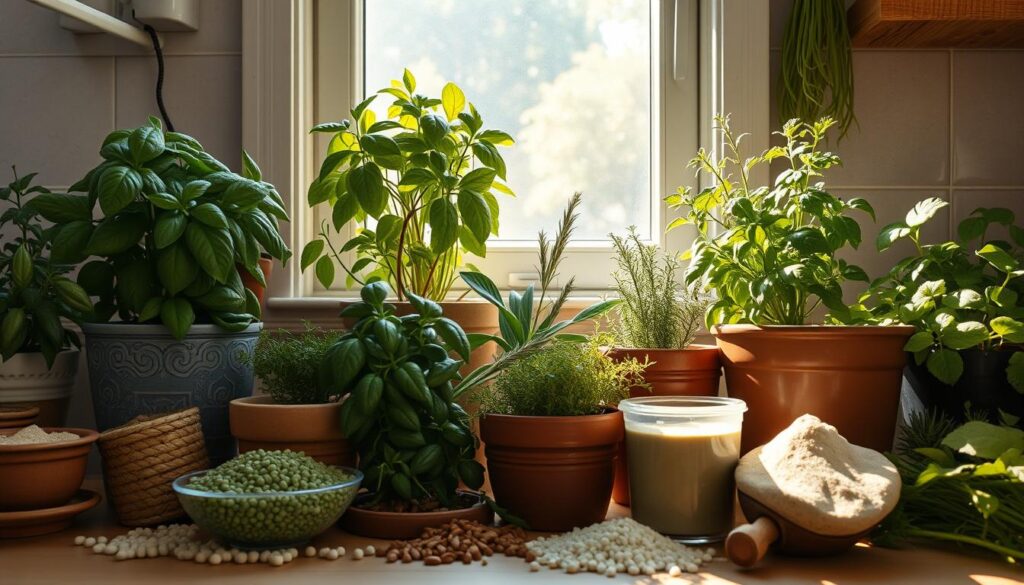
Using the best fertilizers for indoor herbs in your routine will help you grow tasty, healthy herbs at home.
Fertilizing Schedules for Indoor Herbs
For a healthy indoor herb garden, you need more than sunlight and water. You also need the right feeding schedule. The type of herb, the soil it’s in, and the fertilizer you use all play a part in how often you should fertilize. Knowing the best times to feed your indoor herbs ensures they get the nutrients they need to grow well.
When and How Often to Fertilize
Slow-growing herbs like rosemary, thyme, and sage usually need fertilizer once or twice a season. Fast-growing herbs like basil, cilantro, and parsley do better with fertilizer every month. Always follow the fertilizer instructions and change the schedule if your herbs show signs of needing more nutrients.
For the best indoor herb fertilization, use a mild, organic fertilizer made for edible plants. Follow the recommended dosage and frequency. But don’t overdo it, as too much fertilizer can make your herbs grow too much leaf and lose flavor.
- Slow-growing herbs: Fertilize 1-2 times per growing season
- Fast-growing herbs: Fertilize monthly
- Follow fertilizer label instructions and adjust as needed
- Use mild, organic fertilizers formulated for edible plants
- Avoid over-fertilizing to prevent excessive leaf growth
Knowing the best time to fertilize indoor herbs and how often to fertilize indoor herbs helps you create a schedule that keeps your indoor herb garden healthy and full of flavor.
Signs of Nutrient Deficiencies in Herbs
Keeping a healthy indoor herb garden means watching your plants closely. Look out for yellow leaves, slow growth, and weak plants. These could mean your herbs lack herb nutrient deficiencies that need fixing. Spotting these symptoms of nutrient deficiencies in indoor herbs early lets you fix them fast. This keeps your herbs growing well and producing a lot.
Many indoor herbs don’t get enough nitrogen, which shows as yellow or off-color leaves and slow growth. Not having enough phosphorus can turn leaves purple or red. Iron or magnesium shortages cause leaves to lose their green color, a sign of chlorosis.
- Yellowing or discolored leaves can indicate a nitrogen or micronutrient deficiency
- Stunted growth may be a sign of insufficient phosphorus or other essential nutrients
- Poor plant vigor and overall health can be a result of multiple nutrient deficiencies
Stay alert and fix herb nutrient deficiencies quickly to keep your indoor herbs doing well. Using a good fertilizer or nutrient supplements can help. This brings back the right balance of nutrients and makes your herb garden healthy again.
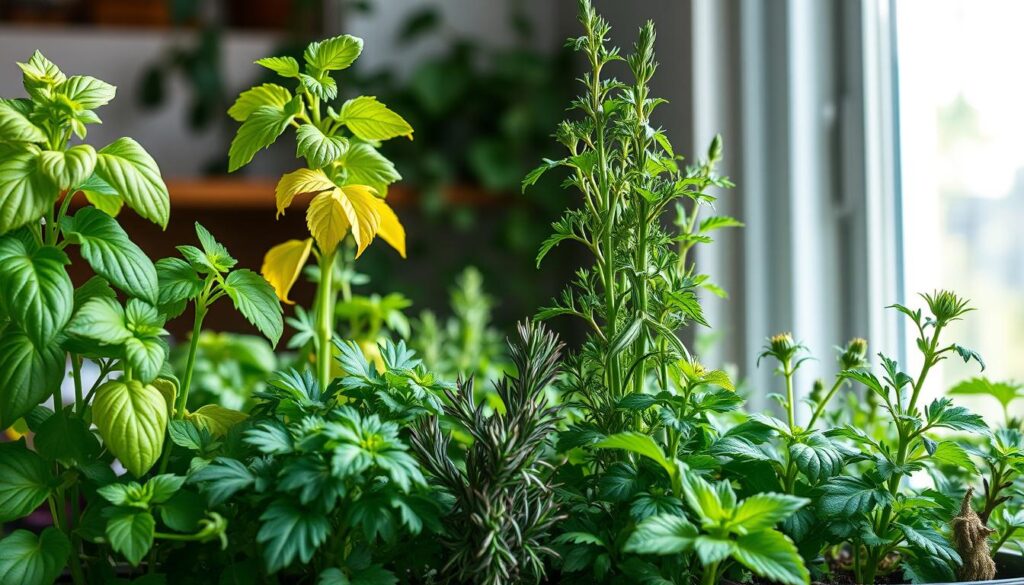
“Healthy herbs start with a well-nourished root system. Pay close attention to the signs of nutrient deficiencies to keep your indoor garden thriving.”
Tips for Successful Indoor Herb Fertilization
Keeping your indoor herb garden healthy means finding the right balance between nutrients and avoiding too much fertilizer. Here are some tips for fertilizing indoor herbs and preventing over-fertilization.
Carefully Follow Fertilizer Instructions
It’s important to read and follow the fertilizer instructions carefully. Using the right amount and frequency helps prevent too many nutrients and protects your plants.
Choose Slow-Release or Organic Fertilizers
Slow-release or organic fertilizers are a good choice. They release nutrients slowly, avoiding sudden spikes that can harm your herbs.
Monitor for Signs of Excess Fertilizer
Watch your herbs for signs of too much fertilizer, like wilting or discolored leaves. If you see these, adjust your fertilizing to keep things balanced.
Maintain Proper Watering and Potting Mix
Good fertilization is just part of the story. Make sure your herbs get the right water and are in a quality potting mix. This helps keep them healthy and balanced.
“Healthy herbs start with a well-nourished foundation. By following these tips, you can unlock the full potential of your indoor herb garden.”
Hydroponic Fertilizers for Indoor Herbs
Growing herbs in a hydroponic system means you need special fertilizers. Unlike soil gardens, hydroponic herbs need their own kind of nutrients. These nutrients give your herbs everything they need to grow strong without soil.
It’s important to watch for signs of nutrient lack, like yellow leaves. Adjusting the fertilizer on time keeps your herbs healthy. Knowing what your hydroponic herbs need helps them grow well.
Choosing the Right Hydroponic Fertilizer
When picking a fertilizer for your indoor herbs, choose ones made for veggies and herbs. These solutions give your plants all the important nutrients. They include:
- Nitrogen (N) for healthy leaf growth
- Phosphorus (P) for strong root development
- Potassium (K) for overall plant vigor
- Vital micronutrients like iron, calcium, and magnesium
Using a top-quality hydroponic fertilizer for indoor herbs makes sure your plants get what they need to do well in your system.
| Nutrient | Function | Importance for Indoor Herbs |
|---|---|---|
| Nitrogen (N) | Promotes healthy leaf and stem growth | Essential for vibrant foliage in indoor herb gardens |
| Phosphorus (P) | Supports strong root development | Crucial for establishing a robust root system in hydroponic systems |
| Potassium (K) | Enhances overall plant vigor and disease resistance | Helps indoor herbs withstand the challenges of a controlled environment |
| Micronutrients | Provide essential trace elements for various plant functions | Ensures balanced nutrition for thriving indoor herb gardens |
“Proper fertilization is the key to unlocking the full potential of your hydroponic herb garden.”
Understanding what hydroponic herbs need and using the right nutrient solution for hydroponic herb gardens helps you grow a beautiful indoor herb garden. This will make your cooking more exciting and delicious.
Conclusion
For indoor herb gardens to thrive, the right fertilization is crucial. You need to give your herbs a balanced mix of nutrients. This can be done with organic or slow-release synthetic fertilizers. Knowing what each herb needs and feeding them regularly is important for healthy plants.
This article has given you tips on how to spot nutrient deficiencies and avoid over-fertilizing. These tips will help your indoor herb garden reach its full potential. With the right fertilizers and care, you can have a lot of fresh, fragrant herbs. This will make your cooking better.
Whether you like organic or synthetic fertilizers, the goal is to find the right balance for your herbs. By following these tips, you’ll grow a vibrant, productive indoor herb garden. This will make your cooking more exciting and your senses happy.
FAQ
Why do indoor herbs need fertilization?
How do the fertilizer needs of herbs differ based on their growth habit?
What type of fertilizer is best for indoor herb gardens?
What are the benefits of using organic fertilizers for indoor herbs?
When and how often should indoor herbs be fertilized?
How can I identify and address nutrient deficiencies in my indoor herbs?
What are the specific fertilizer needs of herbs grown hydroponically?
Source Links
- Read This Before You Add Fertilizer to Your Herbs – https://www.thespruce.com/best-fertilizers-for-awesome-herbs-1761848
- 2024’s Best Fertilizers for Indoor Plants, Tested and Reviewed – https://www.bobvila.com/articles/best-fertilizer-for-indoor-plants/
- The 10 Best Fertilizers for Indoor Plants of 2024 to Help Your Greenery Thrive – https://www.bhg.com/best-fertilizer-for-indoor-plants-6834569


